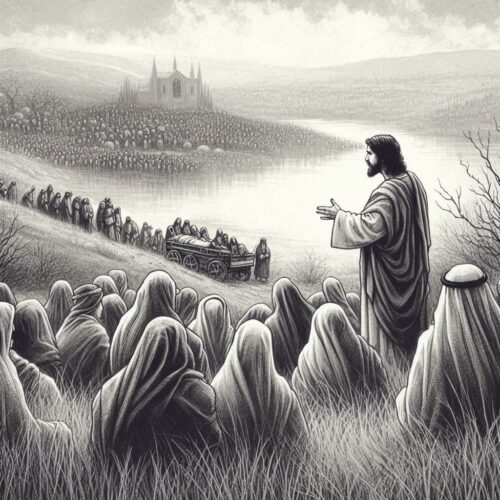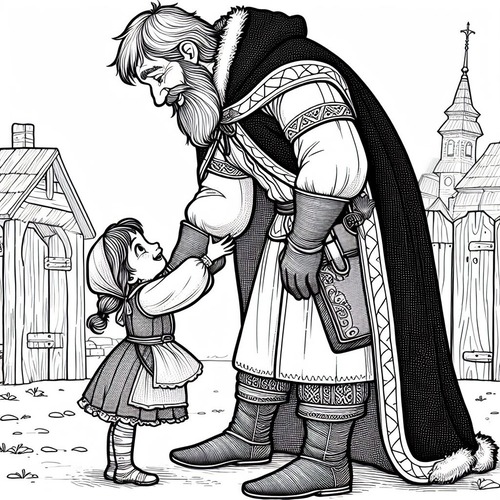“Let The Dead Bury Their Dead”: Jesus’ Radical Call to Discipleship
“Lord, first let me go and bury my father.”
“Follow me,” Jesus replied, “and let the dead bury their dead.”
These words make us flinch. They seem almost cruel—a harsh response to someone asking to perform what appears to be a basic act of human dignity and familial duty. How could Jesus, who taught us to love our neighbours and honour our parents, tell someone to skip a parent’s funeral? Is this the same Jesus who wept at Lazarus’s tomb? Couldn’t discipleship have waited a few hours?
This challenging exchange, recorded in Matthew 8:22 and Luke 9:60, is puzzling to say the least. Yet within these seemingly severe words lies one of Jesus’ most powerful teachings about the radical nature of true discipleship…
THE CONTEXT
To understand this striking command, we must first understand its context. The exchange occurs during Jesus’s ministry in Galilee, where He has been attracting large crowds and potential followers. In Jewish culture, burial duties were considered among the most sacred obligations. The proper burial of parents was seen as a fundamental fulfillment of the command to honour father and mother.
The significance of this request cannot be overstated—it isn’t just about attending a funeral service as we may think of it today. In first-century Jewish culture, burial was a lengthy process that could take up to a year, involving initial burial, waiting for decomposition, and then the final gathering of bones.
THE APPARENT PARADOX
At first glance, Jesus’ response seems to contradict several core biblical principles. The Fifth Commandment explicitly tells us to honour our parents. Throughout Scripture, we see godly men take great care to bury their loved ones—remember Abraham’s purchase of a burial cave for Sarah, recorded for us in detail? Or Joseph, who travelled from Egypt to Canaan to bury his father, Jacob?
The apparent contradiction creates a tension that demands resolution. How do we reconcile Jesus’ seemingly harsh command with these other biblical truths?
REFORMED PERSPECTIVES
The key to understanding the passage lies in recognising the dual meaning of “dead” in Jesus’ response. When He says, “Let the dead bury their dead,” He’s making a profound distinction between the physically dead and the spiritually dead.
From a Reformed perspective, the passage powerfully illustrates the doctrine of total depravity—those without Christ are spiritually dead and can only concern themselves with physical matters. Jesus is saying, in essence, “Let those who’re spiritually dead take care of the physically dead.”
John Calvin, in his commentary on this passage, emphasises Jesus isn’t prohibiting burial duties altogether. Rather, He’s making a statement about priority and urgency. The Kingdom of God demands immediate and complete allegiance.
WHAT THIS COMMAND DOES NOT MEAN
Before we can fully grasp what Jesus is calling us to, we must first clear away some common misunderstandings. These misinterpretations can lead to either unnecessary guilt or an overly harsh application of Jesus’ words.
- Christians should avoid funerals: Jesus Himself attended funerals. He even showed deep emotion at the death of Lazarus, weeping openly (John 11:35). Throughout Scripture, we see faithful believers honouring the dead through proper burial and mourning practices, demonstrating that showing respect for the deceased is fully compatible with devoted discipleship.
- Family responsibilities are unimportant: Scripture consistently upholds the importance of family duties, with 1 Timothy 5:8 even declaring that failing to provide for one’s family is a denial of the faith. Jesus’ own care for his mother Mary, even from the cross, demonstrates that family obligations remain important in the Christian life.
- Immediate urgency overrides all other duties: Jesus’ command doesn’t establish a universal rule that spiritual activities always trump earthly responsibilities. Rather, it teaches discernment in recognizing when legitimate duties might be keeping us from a crucial moment of spiritual obedience.
WHAT THE COMMAND DOES MEAN
Having cleared away misunderstandings, we can now explore the powerful positive teachings embedded in Jesus’ startling command. These truths reveal the heart of discipleship and the transformative nature of following Christ.
- Radical Priority: Following Christ demands our supreme allegiance, above all other commitments and relationships. This priority isn’t just about religious activities, but about a fundamental reorientation of our entire lives around Jesus’ lordship. When conflicts arise between Kingdom purposes and earthly duties, we must be prepared to choose the Kingdom.
- Kingdom Focus: The urgency of Kingdom work surpasses even the most sacred cultural and familial duties. This means being ready to step away from good things when God calls us to better things, and maintaining an eternal perspective even in the midst of pressing temporal concerns. Jesus is teaching us to view all of life through the lens of Kingdom advancement.
- Spiritual Reality: There is a clear distinction between those who’re spiritually alive in Christ and those who remain spiritually dead. This reality should shape how we view our mission and responsibilities in the world. Our primary calling is to participate in bringing spiritual life to those who’re dead in their sins, even if that means leaving certain cultural obligations to those who don’t yet understand Kingdom priorities.
- Immediate Obedience: When God calls, delayed obedience is disobedience. The Kingdom of God demands a readiness to respond promptly to divine leading, even when that response may seem culturally inappropriate or personally costly. This immediacy reflects the supreme value of Christ’s Kingdom over all earthly concerns.
PRACTICAL APPLICATION
The teaching challenges us to examine our priorities and question what “legitimate” responsibilities might be keeping us from a full commitment to Christ. It calls us to evaluate whether we’re using good things as excuses to delay obedience to God’s call.
This doesn’t mean abandoning our responsibilities, but rather viewing them through the lens of Kingdom priorities. Sometimes we must say “no” to good things to say “yes” to better things. The call to follow Christ demands a readiness to step out of our comfort zones and respond immediately to His leading.
CONCLUSION: LET THE DEAD BURY THEIR DEAD
Jesus’ command to “let the dead bury their dead” is deliberately designed to shake us from comfortable Christianity. Far from being a harsh prohibition against honouring the dead, it is a powerful wake-up call to examine what “reasonable” delays and legitimate duties might be keeping us from full obedience to Christ. In these few words, Jesus exposes our tendency to use even good things as excuses to postpone our complete surrender to His lordship.
Yet this teaching, properly understood, brings freedom rather than burden. It liberates us from the endless balancing of competing obligations by establishing a clear priority: Christ above all. When we grasp this truth, we can fulfil our earthly duties not as obligations that compete with our devotion to Christ, but as opportunities to express that devotion through faithful service. The question is no longer whether we should honour our earthly duties, but how we can fulfil them in a way that advances His Kingdom and glorifies His name.
LET THE DEAD BURY THEIR DEAD—RELATED FAQs
Does this mean Christians should avoid attending funerals? Not at all. Jesus himself attended funerals and demonstrated proper grieving, most notably at Lazarus’s tomb. The command is about our ultimate priorities and readiness to follow Christ, not about specific practices around death and mourning. Reformed theology emphasises that honouring the dead can be an expression of our Christian witness when done in proper perspective.
- How can we balance family obligations with discipleship? The key lies not in seeing these as competing priorities, but in fulfilling family duties as an expression of our discipleship. Reformed theology teaches us God typically calls us to serve Him within our providentially-given stations and relationships, including family. However, when family obligations conflict with clear biblical commands or God’s specific calling, we must choose Christ’s lordship while seeking to honour family in whatever ways we can.
- What if I’m the only Christian in my family—should I prioritise ministry over family needs? Our primary witness to unbelieving family often comes through faithful service and honour within family relationships. The Reformed doctrine of vocation teaches caring for family is itself a sacred calling, not a distraction from it. However, when family demands we compromise our faith or abandon Christian obedience, we must stand firm in our ultimate allegiance to Christ.
How do I know when God is calling me to leave legitimate duties for Kingdom work? This discernment comes through prayer, biblical wisdom, counsel from mature believers, and the internal witness of the Holy Spirit. Reformed theology emphasises God’s calling typically comes through ordinary means and aligns with biblical principles, not merely through subjective feelings. The Spirit’s guidance will always align with Scripture and often receives confirmation from the broader body of Christ.
- Doesn’t this teaching promote irresponsible abandonment of duties? No, true Kingdom priority actually leads to more faithful fulfillment of legitimate duties, not less. The Reformed understanding emphasises that God’s sovereignty extends over all of life, including ordinary responsibilities. What changes is our motivation and ultimate reference point—we fulfil earthly duties as unto the Lord, while remaining ready to lay them down if He clearly calls us elsewhere.
- How do I explain this harsh-sounding teaching to non-believers? Help them understand that Jesus often used shocking statements to expose our divided loyalties and reveal the supreme worth of following Him. The Reformed emphasis on God’s total claim on our lives helps explain why such radical commitment is actually reasonable. This teaching reveals both the cost and the surpassing value of Christian discipleship.
How can church leaders support members making difficult choices about priorities? Church leaders should provide both clear biblical teaching about discipleship’s demands and pastoral support for those facing difficult choices. The Reformed tradition emphasises both the corporate nature of Christian life and the importance of wise counsel in decision-making. Leaders should create a church culture that both celebrates radical commitment to Christ and provides practical support for those making sacrifices for Kingdom purposes.
LET THE DEAD BURY THEIR DEAD—OUR RELATED POSTS
- The Cost of Discipleship: Lessons from Luke 14
- Call to Discipleship: Not Your Ordinary Job Description
- The Matthew 16:25 Paradox: What It Means to Lose Your Life to Find It
- Discipleship: What Does it Mean to Deny Ourselves and Take Up Our Cross Daily?
- Mark of an Authentic Disciple: A Growing Christlikeness
Editor's Pick

The Throne-Room Vision: Who Did Isaiah See?
The scene is unforgettable: Isaiah stands in the temple, and suddenly the veil between heaven and earth tears open. He [...]

The Angel of the Lord: Can We Be Certain It Was Christ All Along?
Throughout the Old Testament, a mysterious figure appears: the Angel of the LORD. He speaks as God, bears God’s name, [...]
SUPPORT US:
Feel the Holy Spirit's gentle nudge to partner with us?
Donate Online:
Account Name: TRUTHS TO DIE FOR FOUNDATION
Account Number: 10243565459
Bank IFSC: IDFB0043391
Bank Name: IDFC FIRST BANK






